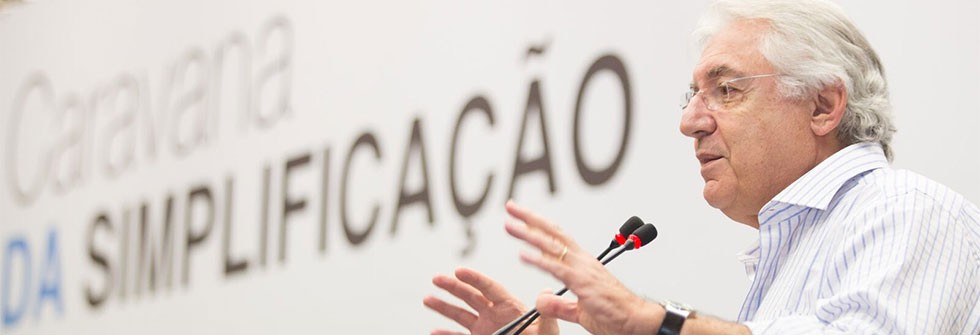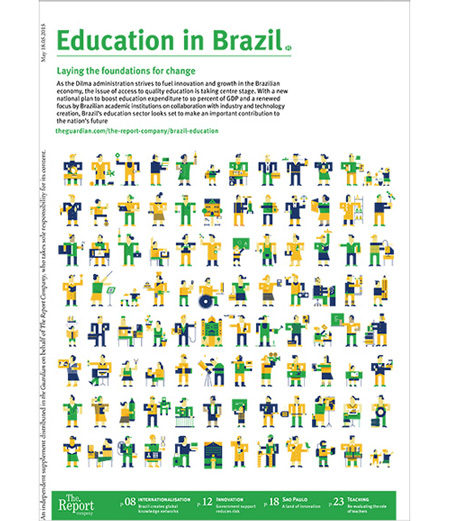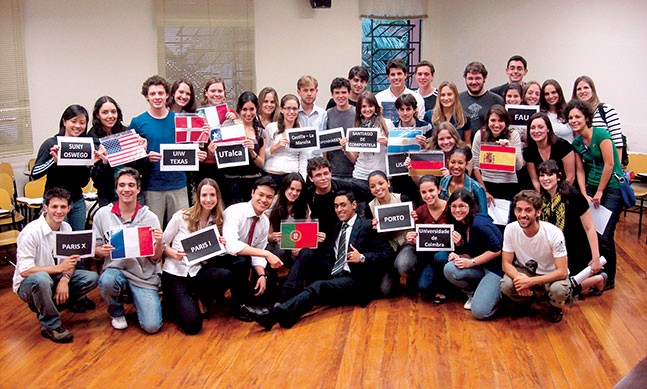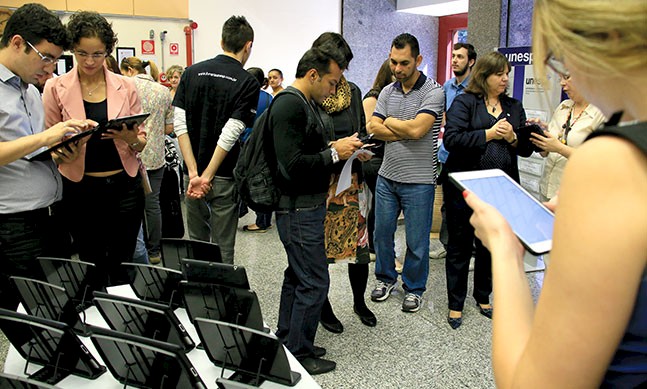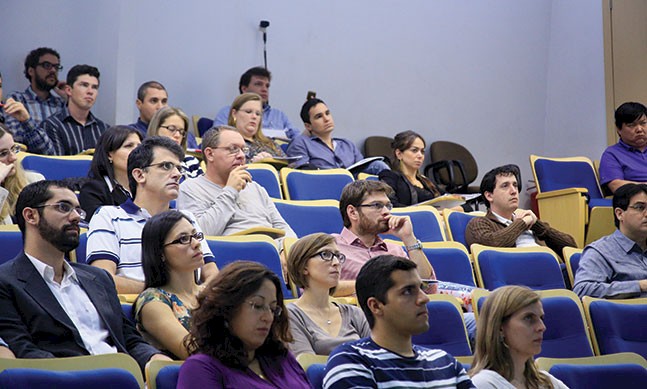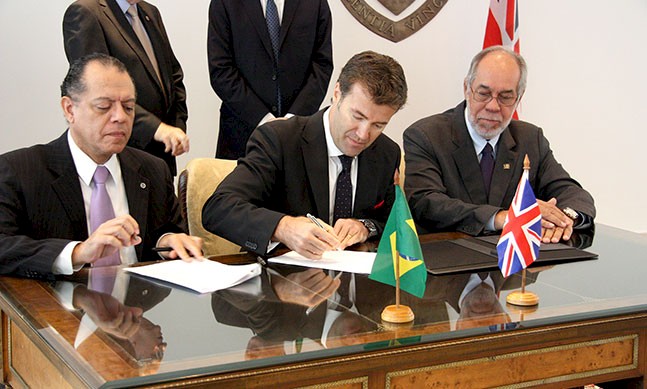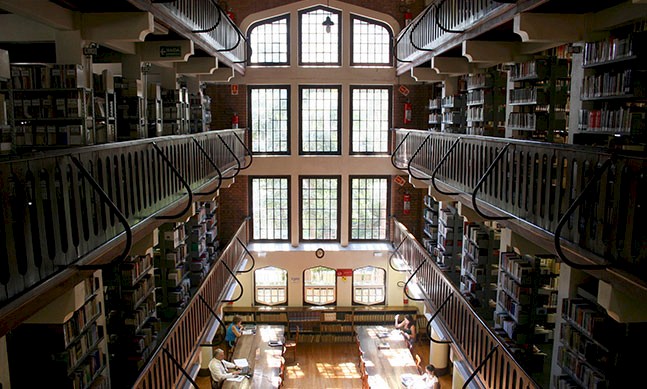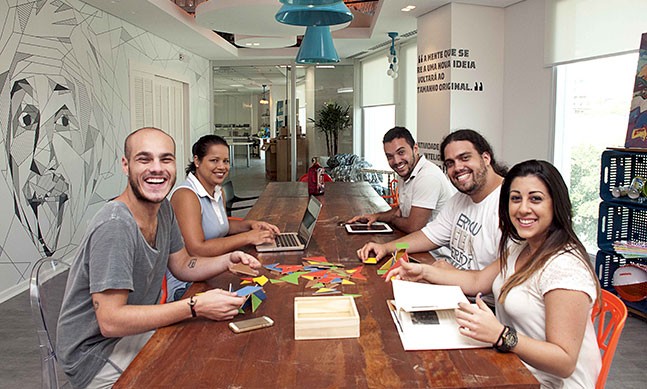An avid supporter of Brazil’s entrepreneurs, Guilherme Afif Domingos is determined to create an environment for small business to thrive in a country better known for the high cost of doing business and its tangled webs of bureaucracy. Investing effort into unlocking the sector’s potential would, he believes, create a self-sustainable, top-down support for the economy, as well as providing fertile ground for international investment.
The Report Company: Has Brazil’s image overseas been damaged by negative perceptions of emerging markets?
Guilherme Afif Domingos: The situation has not changed significantly, but the mood of the people has. Brazil is still the same country and its reserves are still solid. There will always be a lot of speculation in the world, particularly among the many people that make money from it, but I don’t look at the casino, I look at the real economy.
Brazil has two main drivers that have placed the country at the forefront of the global economy and for which we have no competition; agriculture and mining. We have sun 365 days a year and great water reserves, so we can produce crops year round. Europe has to stop for six months of the year and, for the other six, work nervously to get the most from the land. Our agricultural producers are world champions in productivity. Where Brazil loses out is once the crop leaves the farm, in transport and logistics, but agriculture’s profitability backs it up.
The crisis in developed countries drastically reduced investments as well as returns, meaning people are just more determined simply not to lose money. There is a lot of liquidity in Europe and due to the crisis, opportunities for investment were drastically reduced, and so did returns on investment. Capital is frozen, but the opportunities to invest in Brazil’s ports, roads, airports and urban mobility are still there.
TRC: As far back as 2008, during the peak of the world crisis, then-president Luiz Inacio da Silva asked the international community not to speculate but to invest in Brazilian infrastructure. What has changed since then?
GA: It is not a matter of asking. Attractive conditions for investment have to be created, from legal safety to assurances that long-term contracts will be fulfilled and so on. There is no ideological debate to be had on state-held versus private companies; these are temporary concessions by the state to investors. Brazil has the potential to be the greatest player in public-private partnerships (PPPs) today.
TRC: What makes a successful PPP?
GA: First, returns on investment need to be fair. Second, risks need to be mitigated and eliminated as much as possible. For instance, I guided the first large, fully-fledged PPP in the state of Sao Paulo, the metro, in which both the construction and the operations would be carried out by the private sector. The risks were environmental licensing, which the state has to prepare and deliver, expropriations because the State has to assure that they will take place quickly which is not always possible, and even archaeological discoveries which have halted work. Entrepreneurs cannot be at the mercy of such things.
I created a project to connect cities via express trains that cover the entire metropolitan area of the state of Sao Paulo, which includes Campinas, Sao Paulo, the Baixada, Sorocaba and Sao Jose dos Campos. Around 80 percent of the population and the GDP of the state falls within this area. The return on investment would be so high that it would not require subsidies.
“The World Bank highlighted Brazil as one of the worst countries to do business in, but we are making some dramatic changes. We are going to jump from the Middle Ages straight to the digital era.”Tweet This
TRC: Are entrepreneurship and innovation growing in line with the Brazilian economy?
GA: Brazilians are the most entrepreneurial people in the world. Currently, 64 percent of the population would like to run their own business. In the 1980s, during the biggest crisis Brazil ever faced and when many workers were laid off and could not find other jobs, they used their settlement money to open small businesses, and found that they could earn much more as entrepreneurs.
I have been part of this movement for a long time now. I was the one who placed article 179, which demands differentiated treatment for small businesses, in the constitution. Then I regulated the law by creating SIMPLES (Integrated System for Micro and Small Business Tax and Contribution Payments), when I was the president of SEBRAE (Brazilian Micro and Small Business Support Service). Now we have a nationwide version of SIMPLES, which is very strict in ensuring that the federal, state and municipal levels treat small companies differently, with the goal of reducing bureaucracy. Brazil's legal background still needs to be improved and this is the role I play, to facilitate the country's entrepreneurship, not frustrate it.
There is still a lot of bureaucracy. The World Bank highlighted Brazil as one of the worst countries to do business in, but we are making some dramatic changes. We are going to jump from the Middle Ages straight to the digital era.
TRC: Who have you been working with to make this enormous change come about?
GA: The law speaks of a single registry for companies, but in Brazil we have up to ten different registries. The first step, then, is enabling a single, central point: the CNPJ. The second is unifying licensing demands, be they environmental or health. It has been shown that over 90 percent of small businesses are low risk, so inspections shouldn’t be compulsory before operations can start.
Our commitment is to reducing the time necessary to open a company from 150 days to five. This would take Brazil from the 116th position and place it among the top 30. This index is always hammered by the World Bank as a measure of the level of bureaucracy in this country, but this is the ministry's key target this year. Along with SERPRO we will invest around R$30 million in the creation of a web portal for 8.5 million company registries. From then on, companies will not have to go through the trouble of visiting countless departments; it’ll be a single, digital help desk.
TRC: What would you suggest investors can do to be more successful in Brazil?
GA: First of all, look for a local partner. This partner has already been through hell and knows the shortcuts, which, many times, people from abroad are not familiar with. The economy south of the equator works differently to the economy north of the equator.
Second, get used to Brazilians’ perception of urgency and of time keeping. This happens here for the simplest reason. In the northern hemisphere, if the work finishes a day late you may starve in the winter. Here, if you miss a day, nothing like that will happen: fruit will still hang on trees and there will still be fish in the river. This perspective ends up contaminating the general psyche. People were worried about the construction for the World Cup but in the end, everything was ready. Investors need to get used to this because it is natural in a tropical environment, where nature is wise, where nature is plentiful.
TRC: You are a businessman and think like a businessman, so why did you choose to work in the public sector?
GA: I have always worked somewhere between the public and the private sectors. I am an entrepreneur, but I sold my 60-year-old company in 2008. I have always been a man of associations. My professional life started at the Sao Paulo Trade Association but I could not accept that there was no special focus on small companies. At the time, Brazil only cared about the giant corporations. My company was not, in the current sense, a small company, but in insurance, everything is always bigger. I was the leader of the movement of small business holders and I was the first to mobilise them. I organised the first Brazilian Small Business Congress. My career in the public sector has been dedicated to promoting small businesses under the principle that there cannot be political democracy without economic democracy.
“Get used to Brazilians’ perception of urgency. In the northern hemisphere, if the work finishes a day late you may starve in the winter. Here, if you miss a day, nothing like that will happen: fruit will still hang on trees and there will still be fish in the river.”Tweet This
TRC: What impact can small businesses have on the economy as a whole?
GA: If there is one element that could create significant change for a large number of people in the short term, it is small companies. In Brazil there are eight million businesses. If you make things easier for them they might hire a new employee and if all of them do, that's eight million new jobs. Taking families into account, this has an impact on 32 million people. That is the same impact as the family stipend programme, but its self-sustainable. You just need to steer the time and energy of micro-entrepreneurs, direct them at increasing production and sales, not filling out bureaucracy. Let them produce.
TRC: Where does SIMPLES fit into this?
GA: We have developed an electronic platform where small Brazilian companies can catalogue their products and services with its characteristics, making it easier for potential buyers to find them. We will start tapping the international markets in South America, the Caribbean, Portuguese-speaking African countries, Portugal and Spain. This is the first step we will take.
The portal will use taxonomic language that will allow buyers to know what a company's products and services are about. If a buyer is looking for bra straps, he or she will find them. For small businesses, the greatest problem is customs. It is hard to go through customs. If you are producing here and selling there, you need logistics operators here and there. This will be at the heart of this national and international electronic platform. We are working very hard on that.
The portal will also have credit. When you are signing a sale, you need to have export credit. There needs to be a link for that with suppliers. Moreover, the portal will include research capabilities. All government research facilities can offer what they have already done or to make new things based on market demands. This will be the Google of small companies. It will include everything they need to make their life easier.
Accessing credit is also an important problem in Brazil. Uninsured loans are rare. As the Brazilian saying goes, “You only lend silver to those holding the gold.” The financial system only provides credit for individuals. If you need capital goods, you need to pay upfront; if you need consumer goods, you can finance them over 40 months or so. This has to be done through guarantee funds, which provides supplementary assurances for banks to lend long-term for small businesses.
Twenty years ago, I pioneered the Fundo de Aval da Micro e Pequena Empresa (FAMP), a guarantee fund for micro and small enterprises at SEBRAE. I put in R$25 million and told everyone then that it was okay to lose money, that we were prospecting and that we wanted to know whether it was possible to do that with small companies.
My hypothesis was that micro and small enterprises were punctual with their payments. They have their problems but they strive to fulfil their commitments because they do not have the money to pay lawyers to cover their missing payments. I came back to the fund 20 years later to ask where it was. They said it was there still, with the same initial R$25 million. It is now worth R$ 520 million. So, it works.
“If there is one element that could create significant change for a large number of people in the short term, it is small companies.”Tweet This


